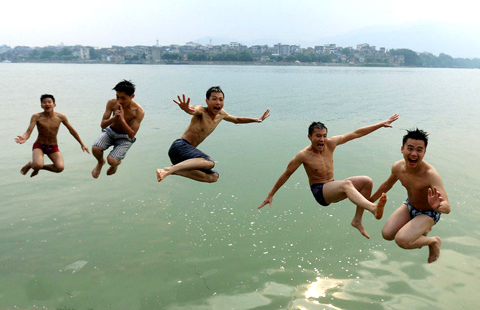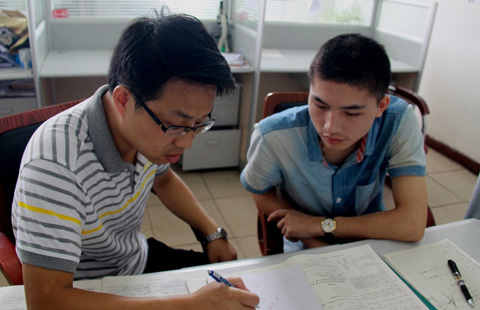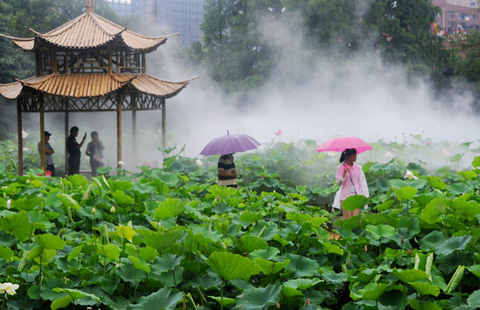Common ground
Updated: 2014-07-06 10:56
By Wong Lok-yee and Liu Xin (China Daily)
|
||||||||
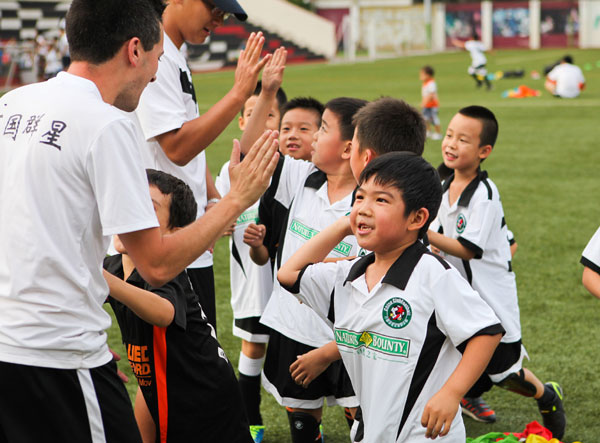 |
|
China Club Football has hired 12 qualified foreign coaches to train children in Beijing. The club has developed a seven-step program to advance kids' soccer abilities. [Provided to China Daily] |
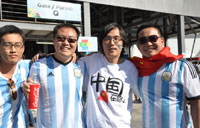 |
| Chinese fans taste World Cup fun |
While the footballers from 32 countries have been showing off their skills at the World Cup in Brazil, a group of children about 20,000 kilometers away from Rio de Janeiro have been practicing their footwork in a park in Beijing. In a sign of China's appetite for the game, kids ranging from 8 to 15 years old head to the park every weekend for soccer classes, which are arranged according to their ability.
They might not yet be in the same league as the legendary Messi or Ronaldo, but that does not stop them from enjoying an hour of soccer training per week.
China Club Football has hired 12 foreign coaches who are qualified by the Football Association or the Union of European Football Associations to train 4,500 children in Beijing.
"Chinese footballers are very eager to learn," says Andy Scott, a coach in the program.
"Whether they're in the professional league or in a school team, they want to learn about more advanced football theories.
"I love to share my experience with them," adds the Englishman, who chose China over South Africa when he decided to teach abroad.
Scott used to work at the English Premier League club West Ham United doing development work, while his colleague Alex Arnold trained professionally at Liverpool but missed the chance of appearing for the club because of a knee injury.
Arnold has forgotten his disappointment at not playing in the English Premier League, and now finds excitement and satisfaction in teaching children soccer in China.
"I love to see their smiling faces on the field," he says.
Ma Tianlang, an 8-year-old who has been in the program for two years, is like most schoolchildren in China in that he participates in many extracurricular activities but has little time for sports.
"The concepts of teamwork and determination are too complex for children that age to understand," Ma's father says. "I just want him to stretch his legs and stay healthy."
He pays 100 yuan ($16.25) per class, but says that it is up to his son's interest and ability whether he becomes a professional player one day.
Ma stayed on the pitch dribbling a soccer ball after his class had ended. His father says he seems to be more attracted to soccer than English, painting and piano - the other things that he learns during weekends.
Although most children in the club do not speak English, communication is not a problem as each coach is accompanied by a Chinese assistant and many coaches speak "football Chinese".
Scott can often be heard shouting "Pass the ball!" in Mandarin.
Apart from the routine training, the club co-organizes matches with the Beijing Football Association, so that children can improve and compete with their peers, he explains.
China's soccer development lags behind the world, and it is time to correct that, according to the foreign coaches.
Arnold says Chinese kids are generally introduced to soccer too late to have much chance of high-level success.
"In England, children play football practically before they can even walk, but here in China, they seldom touch a ball before the age of 4."
Although China is not short of soccer training schools, Arnold believes they need to be standardized and improved as quality coaching is vital for young players, who internalize moves and maneuvers at a very young age.
China Club Football has developed a seven-step program to help the kids progress through various levels.
"They qualify to join the higher level after being evaluated by the coaches," Scott says.
Many soccer schools, training sessions and camps are offered across China. But the coaches are generally far from professional.
China has about 10,000 certified soccer coaches while England has over 35,000. Meanwhile, China has fewer than 7,000 registered teenage players, equivalent to 1.4 percent of those in neighboring Japan.
Beijing recently issued a new policy to include ball games in the middle school curriculum from 2016, when students will be examined on soccer, basketball or volleyball.
The policy is expected to push students to spend more time on outdoor sports. But it is still hard to judge whether it will result in China participating in the World Cup finals in the near future.
Xinhua News Agency

 Photoshoots of actress Li Xiaomeng
Photoshoots of actress Li Xiaomeng
 Council of Fashion Designers of America Awards
Council of Fashion Designers of America Awards
 Fan Bingbing, first Chinese actress in Barbie Hall of Fame
Fan Bingbing, first Chinese actress in Barbie Hall of Fame
 Awarding ceremony of 2014 hito Pop Music held in Taipei
Awarding ceremony of 2014 hito Pop Music held in Taipei
 Zhao Liying's photo shoot for Children's Day
Zhao Liying's photo shoot for Children's Day
 'Taken 2' grabs movie box office crown
'Taken 2' grabs movie box office crown
 Rihanna's 'Diamonds' tops UK pop chart
Rihanna's 'Diamonds' tops UK pop chart
 Fans get look at vintage Rolling Stones
Fans get look at vintage Rolling Stones
Most Viewed
Editor's Picks

|

|

|

|

|

|
Today's Top News
Obama: US always has been a nation of immigrants
Anti-corruption probes increase sharply in 2014
Facebook leases office in Beijing
3 confirmed dead in Florida boat collision
ROK FTA expected this year
Chinese national arrested for alleged trade secret theft
Symantec off the list for all PSB offices
Chinese tourists celebrate the 4th, by shopping
US Weekly

|

|



